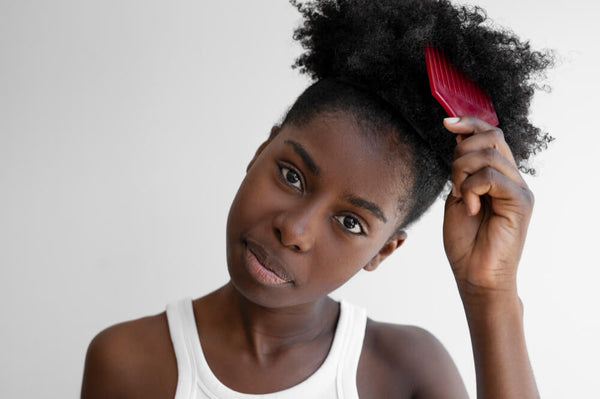Let me ask you something that might feel too familiar: How many of your aunts, cousins, or girlfriends are dealing with thinning edges? How many creative ways have we all learned to hide our hair loss—the strategic parts, the edge control, the wigs we're almost afraid to take off?
I see it in my Atlanta clinic every single day. Women who've been told their entire lives that their hair is "too difficult" or "too fragile," only to discover that the real problem wasn't their hair—it was the lack of culturally competent care.
The statistics don't lie—nearly half of us will experience significant hair loss in our lifetimes. But here's what the numbers don't show: the shame, the frustration, the years we spend thinking we're doing something wrong when the truth is, we've been failed by a medical system that doesn't understand our hair.
Why This Isn't Your Fault
Let's be clear: this isn't about you using the wrong products or making bad styling choices. This is about three systemic problems that have created this epidemic.
Most dermatologists learn about hair loss using textbooks filled with images of straight hair. They're not trained to recognize CCCA in its early stages, or to understand how traction alopecia manifests differently on our scalps.
We're often told to "just stop wearing braids" without any understanding of why we wear them or how to adapt them safely. Meanwhile, the real culprits—like the fibroids that drain our iron stores or the PCOS that drives up our androgens—go undiagnosed for years.
And perhaps most damaging, we've internalized the message that our hair is "problematic" rather than recognizing that we're dealing with legitimate medical conditions that require specific expertise.
The Three Conditions Stealing Our Hair
While any woman can experience hair loss, there are three conditions that disproportionately affect Black women:
-
Traction alopecia isn't just about tight braids—it's about consistent tension over time. That sleek ponytail you wear to the office every day? The wig grip that never gets adjusted? They're slowly compromising your follicles.
-
CCCA is the silent destroyer most women haven't even heard of. This scarring alopecia starts with subtle itching and tenderness, then gradually destroys follicles until they can't grow hair anymore. Early intervention is everything.
-
And the hormonal hair loss that gets dismissed as "genetic" is often driven by conditions like PCOS that go undiagnosed because our symptoms present differently than the textbook cases.
What Actually Helps—Beyond "Go Natural"
I'm not here to tell you to abandon the hairstyles that make you feel beautiful. Instead, let's talk about how to adapt them:
-
If you love protective styles, get them done by stylists who understand tension management. Take breaks between installations. Massage your edges daily.
-
If you're dealing with thinning, come see us before it becomes permanent. We use trichoscopy to spot CCCA years before it causes visible hair loss.
-
If you're exhausted from trying everything, let's run the right tests. Not just basic blood work, but thorough hormone panels, ferritin levels, and inflammation markers that tell the real story.
Our Approach: Treating the Whole Picture
At Nina Ross Hair Therapy, we understand that your hair doesn't exist in a vacuum. We connect the dots between your thinning edges and your heavy periods, between your hair loss and your family history of thyroid issues.
We offer treatments you won't find elsewhere—like exosome therapy that can actually reverse early scarring, and PRP tailored for textured hair. But we also address the underlying health issues that are driving your hair loss in the first place.
Most importantly, we speak your language. We understand the cultural significance of your hairstyles. We know the difference between normal shedding and the beginning of something serious. And we never, ever blame you for the problem.
Your Hair Doesn't Have to Be Another Statistic
I've watched women regain not just their hair, but their confidence. The woman who stopped wearing hats everywhere. The mother who finally let her daughter see her real hairline. The executive who stopped positioning her Zoom camera to hide her thinning crown.
This epidemic doesn't have to claim one more woman. But we need to start treating our hair loss like the medical issue it is, rather than something to be hidden and ashamed of.
Ready to Join the Solution?
If you're tired of being part of this statistic, book your Hair Therapy Evaluation with us today for just $99. Let's address your hair loss with the cultural understanding and medical expertise it deserves.
-














